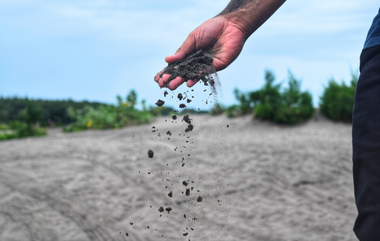LYLG Answers: “Is it Legal to Spread Ashes?”
Scattering ashes seems like a simple way to honor your loved one after they have passed on. This summer, countless families will flock to parks, bodies of water and beyond in the hopes of laying their loved ones to rest in a beautiful location. However, many may wonder: Is it legal to spread ashes?
When spreading ashes, laws and environmental impact should be taken into consideration. As a guide for those navigating loss this season, we compiled a legal guide to scattering ashes. Read on to learn the legality of spreading ashes in national parks, bodies of water and beyond.
National Parks
In the majority of national parks in the United States, spreading ashes is legal. However, there are regulations you must follow. Many require you to apply for a scattering of ashes permit from the National Park Service.
These permits are specific to each park and require that you spread ashes a certain distance away from trails, bodies of water or facilities to avoid human interaction with the ashes. Though it is unlikely the park would pursue legal action if you spread without a permit, we recommend you consult a park ranger for details before scattering ashes.
Bodies of Water
Some families may be headed to a beach or lake this summer and plan to bring their loved one’s ashes along with them. Before you take action, consider one question: Is it legal to spread ashes in a body of water?
In regards to spreading ashes, laws depend on the type and your intended location. The Environmental Protection Agency (EPA) authorized a general permit for burial at sea under the Marine Protection, Research and Sanctuaries Act (MPRSA). This only applies to human remains — non-human remains, such as pets, are not permitted to be buried at sea. If you are considering burial at sea, you do not need to apply for the permit before scattering ashes. However, the EPA requires you to notify them within 30 days of the event with the Burial at Sea Reporting Tool.
Lakes, rivers or other inland waters do not fall under federal regulations — meaning spreading ashes may be legal. States have different requirements and some even prohibit it entirely. Contact your state environmental agency, health agency or mortuary board to determine the legal requirements around scattering in inland waters.
Private Property
Spreading ashes in national parks and other scenic locations is popular during the summer, but some families have unique ideas for scattering. Your loved one may have loved a specific sports team or entertainment venue, so you may plan to honor them at their “happy place.” But is it legal to spread ashes on private property?
Private property could include stadiums, amusement parks, golf courses, homes and other properties. Spreading ashes laws often prohibit this — so, as a general rule, ask for permission before you scatter. If the property owner says no, do not spread the cremated remains anyway. Scattering ashes in this circumstance could put you in legal trouble, with fines or jail time for trespassing.
Environmental Considerations when Scattering Ashes
Though spreading ashes is legal in some locations, you should always consider the possibility of causing environmental harm. Cremated remains contain high sodium levels, making them highly acidic to surrounding plant life. Unfortunately, no naturally occurring soil will effectively correct its elevated pH level — this makes spreading ashes in national parks, bodies of water and beyond a risky move.
Your primary concern may be “Is it legal to spread ashes?” — but you should also consider: “Is it safe?” Naturally, it is not — but with added care, you can protect the environment while honoring your loved one’s memory.
Let Your Love Grow’s soil mixture balances the acidity in cremated remains and spreads ashes without harming existing life. We recommend you allow your loved one’s ashes to sit at least 90 days before scattering to ensure it is 100% neutralized and safe for the environment.
This summer, honor the memory of your loved one in a way that is compliant with spreading ashes laws and safe for the environment — visit our purchase page to explore our options for scattering ashes.










